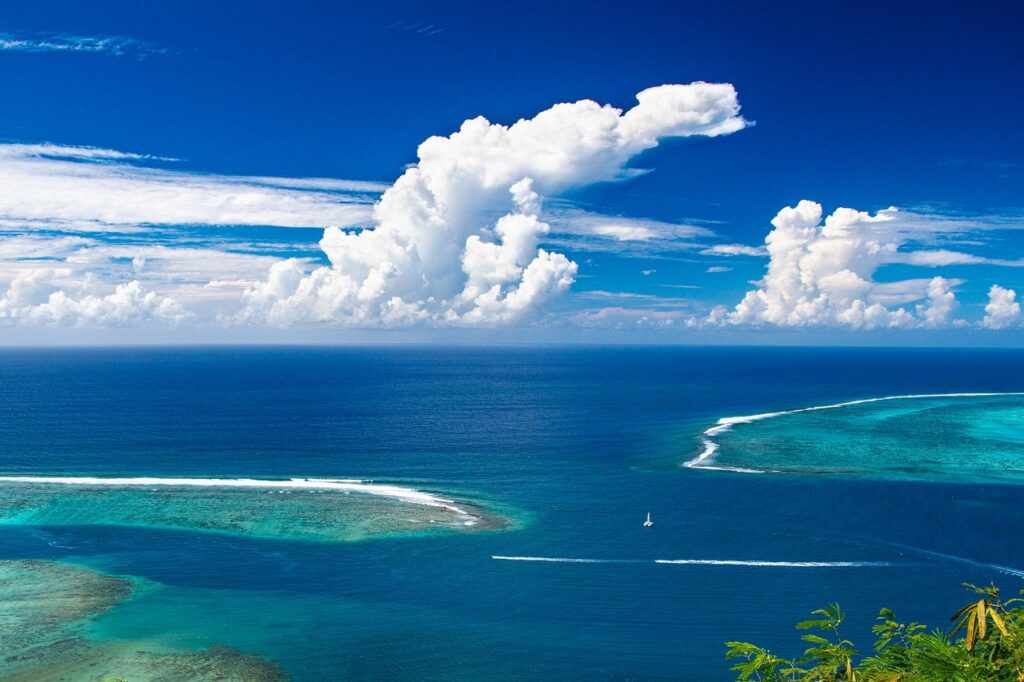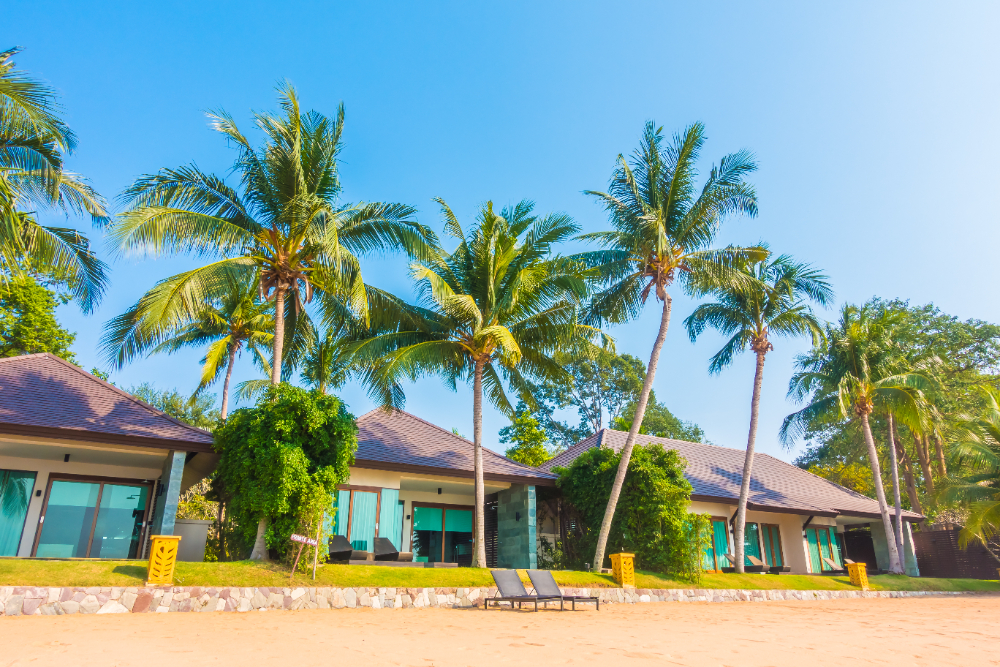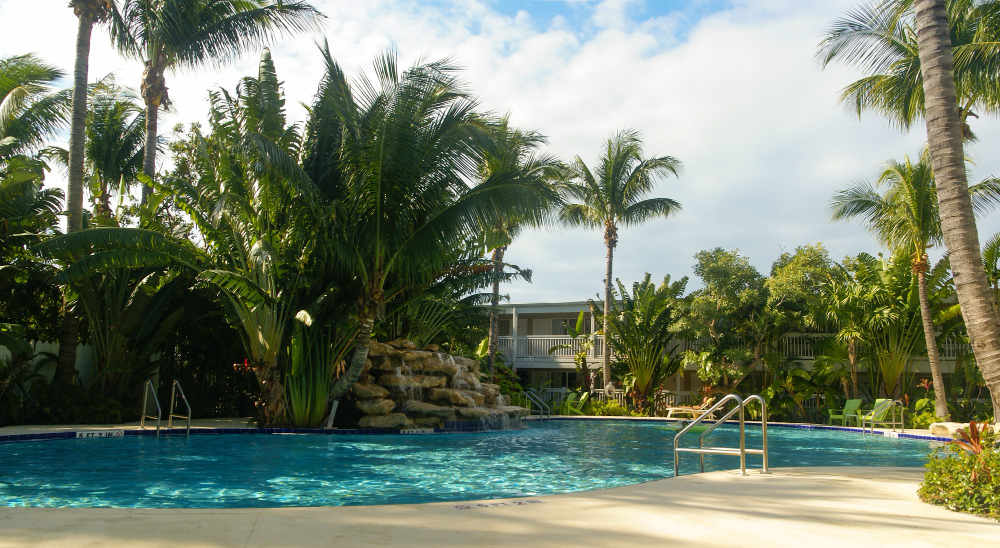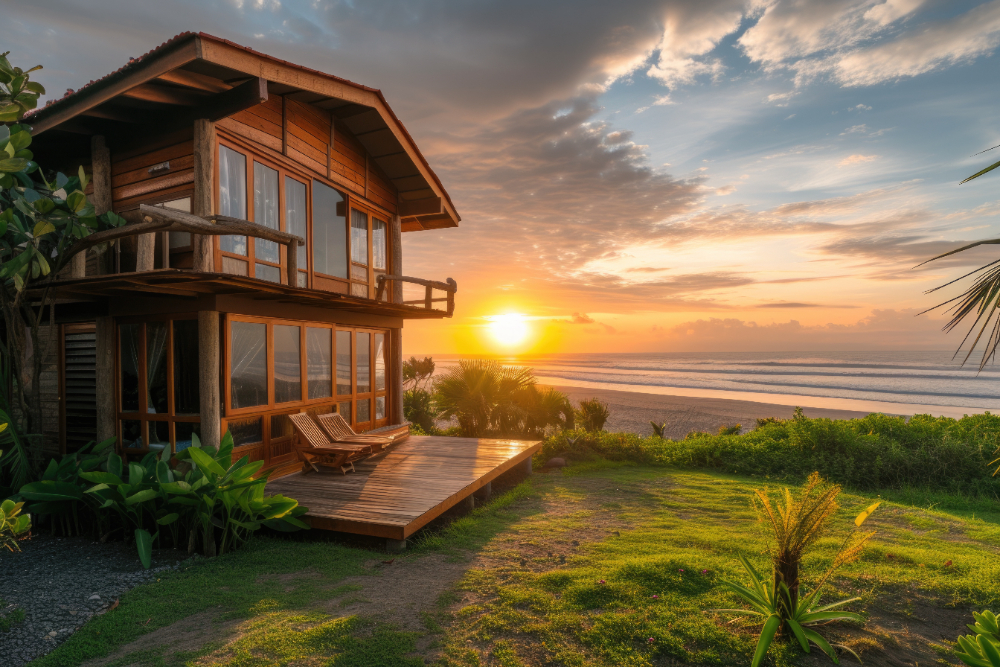When building or renovating a tropical villa, one crucial aspect that often goes overlooked is insulation. As you envision your dream home, it’s essential to consider how proper insulation can transform your living experience. Not only does it play a vital role in maintaining a comfortable indoor environment, but it also enhances energy efficiency—two factors that are particularly important in tropical climates where high temperatures and humidity are prevalent.
Imagine stepping into your villa after a long day in the sun and being greeted by a cool, serene interior. Effective insulation helps regulate indoor temperatures, keeping the heat at bay and ensuring that your home remains a refreshing oasis. Additionally, it protects the structural integrity of your villa by preventing moisture-related issues that can arise in humid environments.
In this article, we will explore the importance of insulation in tropical villas, highlighting various materials and techniques to ensure optimal performance. By investing in quality insulation, you not only enhance the comfort of your home but also contribute to a more sustainable living environment. Let’s delve into how you can create a harmonious balance between aesthetics and functionality in your tropical retreat.
Why Insulation Matters in Tropical Climates
Climate Control
One of the primary reasons insulation is important in tropical villas is for effective climate control. Tropical climates experience high temperatures year-round, making it essential to keep indoor spaces cool and comfortable. Proper insulation helps to:
- Reduce Heat Transfer: Insulation acts as a barrier against heat, preventing it from penetrating the interior of the villa. During the hot summer months, this means you can maintain a more stable indoor temperature without relying excessively on air conditioning. Effective insulation materials, such as reflective insulation and foam board, can significantly lower heat gain, creating a more enjoyable living environment.
- Enhance Comfort: Well-insulated homes provide a more comfortable living environment by minimizing temperature fluctuations. In tropical regions, where outdoor temperatures can vary significantly from morning to night, insulation ensures that your villa remains a retreat from the heat. This stability is particularly valuable for enhancing the quality of life, allowing residents to enjoy their indoor spaces year-round without discomfort.
Energy Efficiency
Another significant benefit of insulation in tropical villas is improved energy efficiency. By effectively regulating indoor temperatures, proper insulation can lead to:
- Lower Energy Bills: With reduced reliance on air conditioning and cooling systems, you can save money on energy bills. Insulation helps maintain a comfortable temperature without overworking your HVAC systems, resulting in lower electricity costs. For instance, homes with adequate insulation can reduce their cooling needs by up to 30%, providing significant savings over time.
- Reduced Carbon Footprint: By improving energy efficiency, well-insulated villas contribute to a lower carbon footprint. This is particularly relevant in tropical regions, where the demand for cooling can significantly impact energy consumption. Using less energy helps promote sustainability and reduces environmental impact, aligning with global efforts to combat climate change. By choosing to insulate your villa effectively, you not only benefit personally but also contribute positively to the environment.
In summary, the importance of insulation in tropical climates cannot be overstated. It plays a vital role in climate control and energy efficiency, ensuring that your villa remains a comfortable and sustainable space. By investing in quality insulation materials and techniques, you can enjoy a cooler, more efficient home while also supporting environmental conservation efforts.

Insulation Materials for Tropical Villas
Selecting the right insulation materials is crucial for achieving optimal performance in tropical climates. The materials you choose not only affect the thermal efficiency of your villa but also contribute to its overall comfort and sustainability. Here are some of the most effective options for insulating tropical villas:
Reflective Insulation
Reflective insulation is a popular choice for tropical villas due to its ability to reflect radiant heat away from living spaces. Typically made from materials like aluminum foil, this type of insulation is particularly effective when installed in attics or under roofs.
- Heat Reflection: Reflective insulation works by reflecting the sun’s rays, which helps to keep indoor temperatures cooler. This is especially beneficial in hot climates where sunlight exposure is high, allowing you to maintain a comfortable indoor environment without relying heavily on air conditioning.
- Installation Versatility: Its lightweight nature makes reflective insulation easy to install in various locations, including ceilings and walls. This versatility allows homeowners to enhance energy efficiency throughout the entire villa.
Foam Board Insulation
Foam board insulation is another effective material for tropical villas. This rigid insulation provides excellent thermal resistance and is lightweight, making it easy to handle and install.
- Minimizing Heat Transfer: Foam board insulation can be installed in walls, ceilings, and floors, helping to minimize heat transfer between the indoors and outdoors. This capability is crucial for maintaining a stable indoor temperature, even during the hottest days.
- Moisture Resistance: Foam board insulation is particularly useful in regions with high humidity. Its moisture-resistant properties can help prevent mold growth, making it a reliable option for tropical environments. Additionally, it helps improve indoor air quality by reducing the chances of mold-related issues.
Spray Foam Insulation
Spray foam insulation offers excellent air sealing capabilities in addition to its insulating properties. This versatile material expands upon application, filling gaps and cracks to create a tight seal that prevents air leaks.
- Air Sealing: The ability to create a tight seal is especially beneficial in tropical villas, where humidity can lead to condensation and moisture problems. Spray foam insulation can be applied to walls, roofs, and attics, ensuring that every nook and cranny is effectively insulated.
- Superior Thermal Performance: With superior thermal performance, spray foam insulation contributes to a comfortable living environment by keeping indoor temperatures stable. This not only enhances comfort but also reduces energy costs associated with cooling.
Natural Insulation Materials
For those seeking eco-friendly options, consider using natural insulation materials such as cellulose, wool, or hemp. These materials are renewable and biodegradable, making them sustainable choices for insulation in tropical villas.
- Sustainability: Natural materials contribute to a more environmentally friendly building process, aligning with the growing trend of sustainable living. They not only perform well thermally but also help reduce the overall carbon footprint of your villa.
- Humidity Regulation: In addition to good thermal performance, natural materials can help regulate humidity levels, which is essential in tropical environments. For example, cellulose insulation has moisture-wicking properties, helping to manage excess humidity and maintain a comfortable indoor atmosphere.
By carefully selecting the appropriate insulation materials for your tropical villa, you can enhance its energy efficiency, improve indoor comfort, and contribute to a sustainable living environment. Each of these materials offers unique benefits that can be tailored to your specific needs, ensuring that your home remains a cool and inviting sanctuary year-round.

Techniques for Effective Insulation
In addition to choosing the right insulation materials, implementing proper insulation techniques is essential for maximizing effectiveness. These techniques ensure that your tropical villa remains cool and comfortable throughout the year while optimizing energy efficiency. Here are some key strategies to consider:
Insulating Roofs and Ceilings
In tropical climates, a significant amount of heat enters through the roof. Insulating roofs and ceilings is crucial for maintaining comfortable indoor temperatures and reducing energy consumption. Consider the following options:
- Reflective Insulation: Installing reflective insulation under the roof can dramatically decrease heat gain. This type of insulation reflects radiant heat away from the living spaces, ensuring that your indoor environment remains cooler, even during the hottest months.
- Foam Board Insulation: Another effective method is using foam board insulation in the ceilings and roof spaces. Foam board provides excellent thermal resistance and helps minimize heat transfer. This method is especially beneficial in humid tropical climates, as it also resists moisture, contributing to a healthier living environment.
- Installation Considerations: When insulating roofs, ensure that all seams are tightly fitted to eliminate gaps. Proper installation is key to maximizing the thermal performance of your insulation materials.
Proper Ventilation
Effective insulation should be paired with proper ventilation to allow for adequate air circulation. Proper ventilation helps prevent moisture buildup and promotes a healthy indoor environment. Here are some tips:
- Roof Vents: Incorporate roof vents to facilitate airflow in attic spaces. These vents allow hot air to escape, reducing heat accumulation and maintaining a more stable indoor temperature.
- Exhaust Fans: Install exhaust fans in bathrooms and kitchens to eliminate excess humidity and odors. These fans can help prevent mold growth and contribute to a healthier indoor environment by promoting air exchange.
- Strategically Placed Windows: Consider positioning windows to optimize cross-ventilation. This can help enhance airflow throughout your villa, reducing the reliance on air conditioning and improving overall comfort.

Sealing Gaps and Cracks
To maximize the effectiveness of your insulation, it is crucial to seal any gaps and cracks in the building envelope. Air leaks can significantly reduce the efficiency of your insulation and lead to increased energy costs. Consider the following methods:
- Use Caulk or Foam Sealant: Apply caulk or foam sealant around areas where air can leak in or out, such as around windows, doors, and plumbing fixtures. This simple step can greatly improve energy efficiency by preventing drafts and heat loss.
- Regular Inspections: Conduct routine inspections of your villa to identify any areas that may need sealing. Pay attention to spots where different materials meet, as these are often prone to gaps and leaks. Regular maintenance ensures that your insulation remains effective over time.
- Insulation Upgrades: If you discover significant air leaks or older insulation materials that are no longer performing well, consider upgrading to more efficient insulation systems that offer better sealing capabilities.
Heveatecture: Your Partner in Sustainable Villa Design
At Heveatecture, we understand the critical role that insulation plays in the design and construction of tropical villas. Our commitment to creating comfortable and energy-efficient living spaces aligns perfectly with the principles of effective insulation.
Customized Insulation Solutions
We provide tailored insulation solutions that cater to the unique challenges of tropical climates. Our team of experts evaluates your villa’s specific needs, recommending the best insulation materials and techniques to ensure optimal performance. Whether it’s incorporating reflective insulation to reduce heat gain or using foam board insulation for superior moisture resistance, we focus on enhancing the overall comfort and sustainability of your home.
Integrating Design with Functionality
At Heveatecture, we believe that aesthetics should not compromise functionality. Our designs integrate effective insulation techniques seamlessly with beautiful architectural elements. By ensuring that your villa not only looks stunning but also performs efficiently, we create a living environment that promotes wellness and tranquility.
Commitment to Sustainability
By prioritizing high-quality insulation, Heveatecture contributes to a lower carbon footprint for your villa. Our commitment to sustainability extends beyond insulation; we incorporate eco-friendly practices and materials throughout the design and construction process. Together, we can create a tropical villa that reflects your personal style while respecting the environment.
With Heveatecture as your partner, you can achieve a harmonious balance between comfort, style, and sustainability in your villa, ensuring a space that is both inviting and efficient. Embrace the benefits of proper insulation and enjoy a home that truly supports your lifestyle.
Conclusion
The importance of insulation in tropical villas cannot be overstated. Proper insulation is essential for regulating indoor temperatures, improving energy efficiency, and ensuring a comfortable living environment. By selecting appropriate materials such as reflective insulation, foam board, or natural options, and implementing effective techniques, you can create a well-insulated space that promotes wellness and sustainability.
Embrace the benefits of proper insulation, and enjoy a more comfortable and efficient tropical villa. With thoughtful planning and execution, you can enhance the quality of your living space while contributing to a healthier planet.

Insulation is crucial in tropical climates to regulate indoor temperatures, improve energy efficiency, and enhance overall comfort by reducing heat transfer. In environments where high temperatures and humidity are prevalent, effective insulation acts as a barrier, keeping your villa cooler and more comfortable while minimizing the reliance on air conditioning systems. This not only promotes a more enjoyable living experience but also helps to save on energy costs.
Effective insulation materials for tropical villas include reflective insulation, foam board insulation, spray foam insulation, and natural materials like cellulose or wool. Each of these materials offers unique benefits that cater to the specific challenges of tropical climates. For example, reflective insulation effectively reduces heat gain, while spray foam insulation provides superior air sealing capabilities.
Reflective insulation works by reflecting radiant heat away from living spaces, helping to maintain cooler indoor temperatures in hot climates. Typically made from aluminum foil, this type of insulation is installed in attics and roofs, creating a barrier against the sun’s heat. By keeping heat outside, reflective insulation contributes to a more comfortable indoor environment and reduces the need for excessive cooling.
Spray foam insulation is a type of insulation that expands upon application, filling gaps and cracks to create an air-tight seal. This not only improves thermal performance but also enhances moisture control, making it particularly beneficial in tropical villas where humidity can lead to condensation issues. By preventing air leaks, spray foam insulation helps maintain a stable indoor climate and enhances overall energy efficiency.
You can improve ventilation by incorporating roof vents, exhaust fans, and strategically placed windows to promote air circulation and prevent moisture buildup. Proper ventilation works in tandem with insulation to maintain a comfortable indoor environment. By ensuring adequate airflow, you can help mitigate humidity issues and enhance the overall quality of indoor air.
It’s a good practice to check your insulation at least once a year, especially after extreme weather conditions, to ensure it remains effective and free from damage. Regular inspections allow you to identify any areas that may require repairs or upgrades, ensuring that your insulation continues to perform optimally and keeps your villa comfortable.
While some insulation types can be installed by homeowners, it’s often best to hire a professional for complex installations, particularly for spray foam insulation. Professional installers have the necessary expertise and equipment to ensure that the insulation is applied correctly and efficiently, maximizing its effectiveness and avoiding potential issues.
Signs of inadequate insulation include fluctuating indoor temperatures, high energy bills, drafts, and visible condensation on windows or walls. If you notice these indicators, it may be time to assess your insulation and make improvements. Proper insulation is essential for maintaining a comfortable living environment and minimizing energy consumption.
Yes, insulation can help reduce noise transmission between rooms and from outside, contributing to a quieter and more comfortable living environment. Insulation materials like foam board and spray foam are particularly effective at soundproofing, allowing you to enjoy a peaceful retreat within your tropical villa.
Proper insulation improves energy efficiency, reducing the need for heating and cooling, which lowers energy consumption and helps reduce your carbon footprint. By utilizing less energy, well-insulated homes contribute to a more sustainable lifestyle, making them an environmentally friendly choice for homeowners looking to minimize their impact on the planet.
